After quite a bit of digging, here are the best non-toxic flip fop and sandal options we could find.
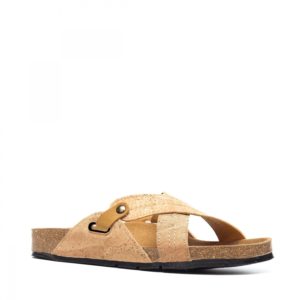
Our top pick
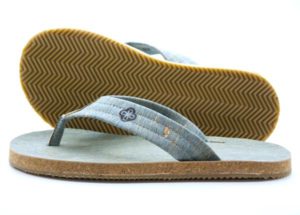
Runner up
My goodness is there a lot of greenwashing in the footwear industry! Seemingly every brand these days tries to claim that their shoes are eco-friendly and socially responsible if not outright saving humanity somehow. The reality, though, is that there are very few companies out there making genuinely eco-friendly flip-flops or non-toxic sandals.
After hours of digging around in so-called ‘sustainability reports,’ I’ve found a few contenders. So, if you’re looking to be more sustainable this spring, check out the most eco-friendly and best non-toxic sandals and flip-flops currently available, with the caveat that pretty much no footwear is truly non-toxic. (Want to know more about the environmental impact of flip-flops? Scroll to the end!)

Nae
Highlights: Offered in a wide range of shoes that are made of sustainable materials like recycled plastic bottles, rubber tires, organic cotton, cork, and pineapple leaf fibers.
Nae make a wide range of shoes using a variety of sustainable materials including recycled plastic bottles and rubber tires, cork, organic cotton, and even pineapple leaf fibers as Piñatex! All of Nae’s shoes are vegan. Synthetic microsuede also features in some designs and this is OEKO-Tex certified, meaning it’s more eco-friendly and non-toxic than standard materials.
The Paxos Cork flat sandal is a good example of this as it is made with natural cork lined with OEKO-Tex 100 certified microfiber and the Kos Cork sandal is similar. These are made in a system free of CO2 emissions, and the resulting sandals are antibacterial and antimicrobial thanks to cork’s natural properties. Nae also use nickel-free rivets to secure the straps and the outer sole is made of recycled car tires, with a footbed made of cork and natural rubber for arch support.
Nae’s shoes are handmade in Portugal and the company runs a Re-Move project creating products from fiber fished out of the ocean.
Some of my favorites from the Nae collection include:
Another great option is the Jackie Blue Block Heel vegan sandal. These are made with a 100% GOTS certified organic cotton upper, OEKO-Tex 100 microfiber and 10% polyurethane lining, as well as a recycled rubber sole (neolite).
The Gatria ankle strap flat sandal is another contender for a non-toxic and eco-friendly sandal. This one is made with an 80% Piñatex and 20% PLA (bioplastic) upper, making it super breathable, and a lining made with OEKO-TEX certified microfibre and 10% polyurethane.
The Kajam Slingback Cork Sandal is made with a breathable cotton embroidered laminated cork upper, a neolite sole, and an OEKO-Tex microfiber and PU lining and straps.

Cima Sandals
Highlights: Composed of a natural, biodegradable cork, recycled rubber sole, natural latex, and a little bit of nylon.
Cima Sandals are made with natural, biodegradable cork, a recycled rubber sole, and natural latex, plus a little nylon. This makes the sandal mostly biodegradable and sustainable, and largely free from toxic chemicals, at least in direct contact with your bare feet.
The company uses a cork and natural latex sole as the heart of the flip-flop and a cork fabric strap, so as to reduce any need for plastic. The bottom layer is nice and grippy even on wet surfaces, thanks to recycled rubber.
Why cork? Well, it’s a renewable resource, highly durable, non-toxic, and naturally antibacterial and antifungal, which is great for keeping feet from getting funky.
Cima Sandals use cork sourced from Portugal, which produces around half of the world’s cork supply. They also manufacture the sandals in Portugal, which means a lower carbon footprint overall. The sandals are packaged and delivered without plastic, making them even more eco-friendly and non-toxic.
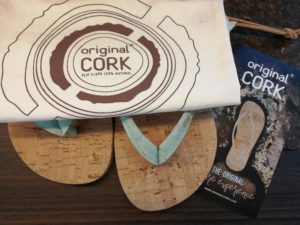
Original Cork Ship Flip-Flops
Highlights: Handmade, vegan-friendly, plastic-free, and made almost entirely of cork!
Handmade using little but cork, Original Cork Ship Flip-Flops are vegan-friendly, plastic-free, made in Portugal, non-toxic and eco-friendly. The company offers free shipping and an organic cotton travel bag to keep your flip-flops in top shape.
Original Cork has been making flip-flops from cork since 2015 and has a comfortable, patented design that has proven very popular with the Etsy crowd. In addition to the natural cork color, they also offer a variety of earth tones.
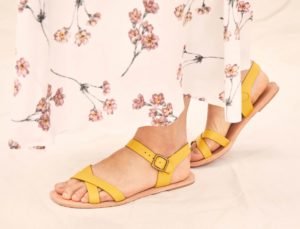
Christy Dawn
Highlights: Eco-friendly sandals made with leftover (deadstock) leather and fabric by a Fair Trade company.
LA-based and Fair Trade, Christy Dawn uses upcycled deadstock fabric and leather for the bulk of most of their pieces, including sandals. Because they use deadstock materials, their collection is full of limited edition designs, meaning you could soon be sporting something unique on your feet!
The Dawn Sandal is their classic Greek-style flat sandal design and I’m especially fond of the Chamomile Leather look. This one is made using leftover (deadstock) fabric and new, organic cotton. The sole is made with deadstock leather, as are the straps, and the company advises sizing up if between sizes.
Christy Dawn make their sandals and other designs in LA and India and are working toward a fully regenerative ‘fibershed’ – like a watershed, but a supply chain for fibers.
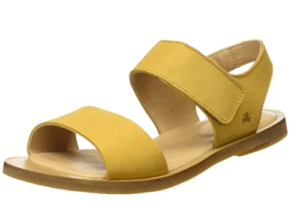
El Naturalista
Highlights: Made from cotton and seaweed by a company that offers a fairly robust environmental report detailing their eco-conscious efforts.
El Naturalista has been around since 1998 and make comfortable and stylish shoes including sandals made with cotton and seaweed.
The company makes their shoes in their own facilities, meaning they have strict control of their manufacturing process. It also means they can make efficient use of materials and incorporate recycled and sustainable materials. El Naturalista also recycles cardboard, cork, excess microporous materials, and fishing nets recovered from the ocean with their own on-site facilities.
El Naturalista has a fairly robust environmental report that details measures they have or intend to implement around energy efficiency such as switching to LED lighting and renewable energy sources. They also look to improve water consumption and by 2025 aim to have at least 25% of all products be made of recyclable, organic, or renewable materials and to have greater transparency for that information.
I do take issue with El Naturalista’s current presentation of their environmental progress however. It’s all too easy to read their ambitions as their current practices, but it’s not actually clear if they already use recycled zippers, or make their wedges and insoles with recycled cork, nor if they are currently using GOTS certified organic cotton. It would be great if this were clearer.
That said, even if these are goals for greater sustainability, the detail is impressive and this is a key part of actually taking those steps. Other goals include using 100% recycled eco-friendly packaging and carrying out 100% of manufacturing at their own facilities to minimize transport-related emissions. They also aim to have chrome-free leather as part of their range.
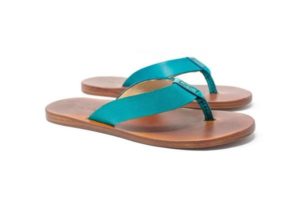
Jivanas Women’s Turquoise Hira Sandal
Highlights: Women-owned company that emphasizes fair trade standards across their supply and manufacturing train with 100% biodegradable shoes.
Jivanas is a women-owned company that hires artisans in Nepal to make their shoes, ensuring ethical fair trade standards across their supply and manufacturing chain. Their shoes are 100% biodegradable, including their vegetable tanned Italian leather which is tanned with tree bark, leaves, and fruit instead of chemicals that can mean it isn’t biodegradable. Other materials include organic plant-based latex adhesives, water-based dyes, cotton thread and beeswax conditioner.
The Hira sandal has a soft, lined upper and cushioned thong made from leather and colored with water-based eco-friendly dyes. The all-leather sole molds to the foot for extra stability and comfort.
While the carbon footprint of leather is still high, it’s great that Jivanas otherwise use very eco-friendly materials and processes.
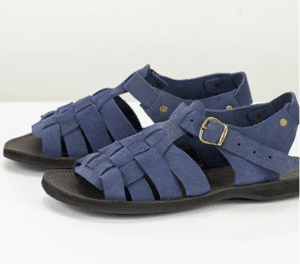
Fauna
Highlights: The Caiques line is made using things like old airplane tires and leather scraps; leftover materials are either recycled or given to local artisans for further repurposing.
Fauna offers shoes from a variety of brands with people, product, and planet in mind. In the case of Caiques, this means using things like leather scraps and old airplane tires to handmake sandals as well as cotton laces. Any scrap materials leftover are either recycled or given to local artisans to repurpose even further.
Through their shoe collection, the company recycles approximately 2 tons of airplane tires every season. They also offer lifetime maintenance to repair any small defects that appear in the shoes over time and are eco-friendly in the sense of creating timeless, durable designs.
Fauna offer a Green and Safe collection that uses organic and biodegradable materials and non-chemical fabric processing, as well as energy conserving production measures while employing people under fair working conditions. And Fauna were a sponsor of Peace Boat’s sustainable fashion show which highlighted how the fashion industry could help in reaching the UN’s sustainable development goals.
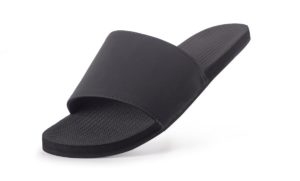
Indosole ESSNTLS Slide
Highlights: Vegan-friendly shoes made in part from recycled tires and sold by a Certified B Corp.
Indosole has been a B Corp since 2014 and make sustainable and vegan friendly shoes in part from recycled tires for the soles. Uppers are made with organic canvas, banana leaves, and grass. The shoes are made by artisans in Indonesia and are very affordable.
Indosole’s ESSNTLS Slide sandal is an eco-friendly waterproof sandal made with recycled rubber soles, a contoured natural rubber footbed, embedded arch support, and vegan-friendly uppers. The ENVRO Fiber is an Indosole creation that uses little water and all-natural dyes and is supple but robust, meaning no rubbing. The sandal is light and flexible, but durable, and is made by hand without ‘fuel powered machinery.’ These sandals can also be cleaned and dried, making them a great choice for hygienic footwear.
The natural rubber is ethically sourced in Indonesia and is dyed with natural dyes with no chemical and toxic run-off. And because it is tire rubber, these sandals have great grip and help keep tires out of landfill and from being burnt (which releases toxic fumes).
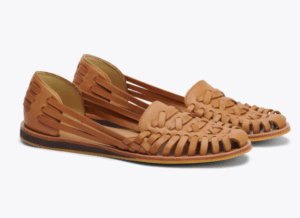
Nisolo
Highlights: A B Corporation that seems to be taking an impressive number of right steps to follow through with environmental initiatives.
Nisolo is a B Corp making shoes under fair trade conditions in Peru. They are looking to achieve ISO 9001 and 14001 certification for Quality Management and Environmental Management, and to run part of their factory using renewable energy.
Best known for their huaraches, Nisolo make shoes that are durable, comfortable, and stylish. The downside is a lack of transparency over their leather tanning process, meaning chrome tanning is likely still used for at least some of their shoes.
Nisolo are on a mission to reduce the negative effects of fast fashion. That’s why the company has partnered with Soles4Souls, a non-profit that gives gently used shoes to micro-entrepreneurs in the developing world, for them to resell within their communities. This somewhat circular fashion model goes some way to reducing materials in landfill, with Nisolo having collected more than 5,000 shoes under this initiative. Any shoes that are sent to Nisolo that are too worn are recycled instead.
Nisolo also donates to forest protection projects in the Amazon Basin as part of their carbon offsetting initiative and they have partnered with Ecosphere+ on an insetting program, meaning they are trying to reduce emissions within their value chain.
In addition to paying a living wage, Nisolo offers a financial literacy program to workers, meaning that 100% of employees now have a bank account, compared to 10% four years ago.
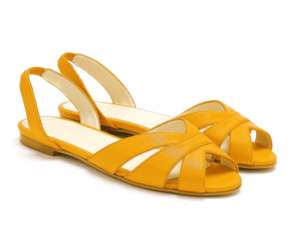
Beyond Skin – Lolly Yellow Faux Leather Flat Slingback Vegan Sandals
Highlights: PETA-approved vegan-friendly sandals handmade in Spain with 100% recycled faux leather linings.
Beyond Skin offer a variety of vegan-friendly sandals and shoes including the Lolly flat sandal in soft yellow faux leather with a slingback strap. PETA approved vegan, these sandals have a faux leather upper and lining and a resin flexi sole with a padded insole for comfort.
The shoes are handmade in Spain and the lining is 100% recycled faux leather with a plant polymer finish. The synthetic leather is made from cotton-backed polyurethane which is a tad better than PVC for the environment and less energy-intensive than leather. All of Beyond Skin’s shoes have an insole made with around 70% post-consumer cardboard. Their Sole range has a sole made from flexible natural latex while all their other shoes use rubber resin (70% or so recycled).
Beyond Skin use eco-friendly packaging and give 5% of profits to grass-root environmental and social projects.
What to look for in an eco-friendly, non-toxic sandal or flip-flop
Billions of flip-flops are lost to the waves every year or end up in landfills where they don’t break down but can leach toxic chemicals into the earth and water. Some 90 tons of flip-flops have been found on the East African coastline some years. And in one case, flip-flops were responsible for blocking the clean water supply of a Kenyan slum.
Flip-flops and plastic sandals contain a plethora of chemicals that can adversely affect seabirds and other wildlife, not to mention the humans making and wearing them. And ‘natural’ footwear isn’t necessarily much better. Sure, these don’t pollute the Earth with microplastics, but standard leather tanning makes this natural material non-biodegradable and highly toxic, involving about 250 chemicals with varying degrees of harm to human and environmental health, not to mention the cows and other animals slaughtered for the industry.
So, what’s the alternative? Unfortunately, pickings are slim in this sector, with a lot of greenwashing but not much in the way of genuinely non-toxic, eco-friendly sandals or flip-flops. Happily, a few companies have figured out how to make durable, comfortable, and stylish flip-flops from cork, natural rubber, and organic cotton. Others do their best with recycled materials, including synthetic rubber from tires, plastics retrieved from the ocean and waste streams, and other recycled materials. Some companies also use deadstock fabrics and leather that would otherwise go to waste. These are not necessarily non-toxic but they are an improvement on virgin plastics, rubber, and leather in terms of environmental impact.
Buying from companies that are making a genuine effort to improve fast fashion is one way to make your dollars work for people and planet. You can also help by using recycling schemes run by some of these companies or by using Terracycle’s All-in-One recycling box (view on EarthHero). If you have flip-flops to recycle, see if they are made with PLUSfoam as you can mail these back for recycling.